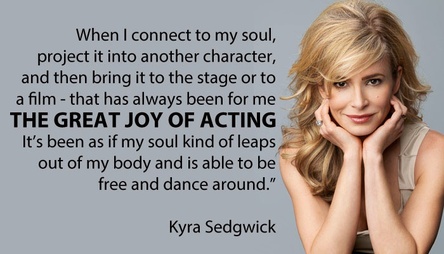|
Photo by Debra Lopez
|
 No one told me this career stuff about how to survive as an actor coming out of grad school and I wish someone had. So you don't walk around in the dark like I did, here's what I know and it's my gift to you. Think of me as your cheering squad on the sidelines. I had an amazing coach who taught me the Business of Acting, so I know the importance of mentoring. I'd like to continue to shape the newsletter and my blog to meet your needs and for that, I'll need your help. Imagine I'm your FREE personal coach you meet with weekly. What would be your two most burning questions for me in the first session? I'm all ears...Dream on Dreamers...
38 Comments
Sean
11/4/2014 04:29:21 am
I have a chance to play Othello in a regional theatre company but an opportunity also awaits me in The MTA company. I'm an actor firsthand but should I give up my passion for a steady paycheck?- Sean
Reply
11/4/2014 06:07:03 am
Hi Sean:
Reply
Kendra
11/6/2014 04:42:00 am
1) I'm doing a six week book it challenge with a group of actors and my goal is to be book at least a day player role on network television show. How do I, a nonunion actress with no agent and a lack of credible experience (although I have trained) attain such a goal (without necessarily breaking my bank)?
Reply
11/6/2014 05:05:03 am
Hi Kendra:
Reply
11/6/2014 05:26:14 am
Okay, let's talk about Kendra's second question:
Reply
Michelle Hartley
11/6/2014 08:55:35 am
Thank you April. Basically, where a casting says submit electronically, I need to tell my agent??
Reply
11/7/2014 06:39:32 am
Great question, Michelle:
Reply
Tiffany Thompson
11/13/2014 04:38:16 am
Hi April,
Reply
11/13/2014 05:27:00 am
Hi Tiffany:
Reply
Lin
11/13/2014 05:49:56 am
Hi April,
Reply
11/13/2014 06:14:19 am
Absolutely, Lin!
Reply
11/13/2014 05:54:37 am
Tiffany's 2nd Question: I wrote and performed a solo play with music over the summer but it needs a lot of work. How do I produce the play in an off broadway theater in New York after making the revisions?
Reply
Tanya Martin
11/15/2014 01:02:56 am
Viola Davis went to Juilliard not Yale.
Reply
11/15/2014 05:29:43 am
Noted, Tanya. The pleasure is all mine. I love to see artists take back their power...we deserve it...
Reply
11/15/2014 03:33:00 am
I am an Actor/ Comedian who has been swimming in both pools for the last 8 years or so. I'm finding out that my Stand-up career is getting me in front of more people of importance so to speak and gives me more opportunities. But I enjoy and love acting more and revel in the team effort of it.I've been told to concentrate on one of the other but I can't choose. Should I or shouldn't I? The bottom line is that I have not gotten that big break from either of them.
Reply
11/17/2014 04:22:00 am
Hi William:
Reply
Kendra
11/16/2014 09:07:27 am
How do we get film and tv credits to impress casting directors if we need casting directors to get film and tv credits?
Reply
11/17/2014 04:34:14 am
Hi Kendra:
Reply
Jonathan Hooks
11/18/2014 12:04:42 pm
What does a producer do and how do they make money?
Reply
11/18/2014 12:37:54 pm
Hi Jonathan:
Reply
Craig Dolezel
11/18/2014 12:06:23 pm
Hi April:
Reply
11/18/2014 01:25:19 pm
Hi Craig:
Reply
Leslie
11/18/2014 02:40:06 pm
How do you deal with nervousness before and during graduate school auditions or any audition for that matter? How can one turn their nerves into helping them through the process?
Reply
11/19/2014 12:02:53 pm
Hi Leslie:
Reply
Hi April! I hope you're well!
Reply
11/21/2014 09:21:28 am
Hi Angela:
Reply
Carmen Lobue
11/21/2014 09:30:52 am
Hi April:
Reply
11/24/2014 08:50:12 am
Hi Angela:
Reply
11/25/2014 06:54:20 am
Hola Dahiana:
Reply
K
12/5/2014 07:35:17 am
Not sure if you have heard of TAPNYC (The Actor's Project it's also referred as) but is it a scam? I hear it's not a scam per second, but a bait and switch. You pay this much, and then oh wait pay this much, and more and more. I think it's used for actors who want agents. Not sure if it's any different than Actor's Connection or One on One? I guess to tie in on this, what are your thoughts on pay for play?
Reply
K
12/5/2014 07:37:40 am
If an actor gets offered their SAG or Equity card before they really build their resume, should they accept it or should they wait until they have more experience? But, then again, who's to say they'll ever get the chance again?
Reply
Shemeka Foster
1/23/2015 04:05:49 pm
First I want to say everything that you said on that webinar about the universe responding accordingly is very true. I truly appreciated your honesty and candor about the industry.
Reply
1/23/2015 04:17:12 pm
Hi Shemeka:
Reply
E
3/12/2015 12:58:53 am
Curious as to what non union actors can do to protect themselves. I was in a situation where the fellow promised to pay us, and he did, delayed, but he did. So, we continued to perform and then no payment. Found out he was a liar. The actors just want their money back, but legally there is nothing they can do aside from maybe sue. What can we do? Should we warn others about this man?
Reply
E
3/25/2015 11:35:07 am
Hi E:
Reply
6/29/2015 05:45:20 pm
Your blog is really good. My question is "How do I start an acting career?"
Reply
april
10/19/2017 10:20:04 pm
have u signed up for my mailing list, thedreamunlocked.com?
Reply
Your comment will be posted after it is approved.
Leave a Reply. |
Categories
All
|
 RSS Feed
RSS Feed